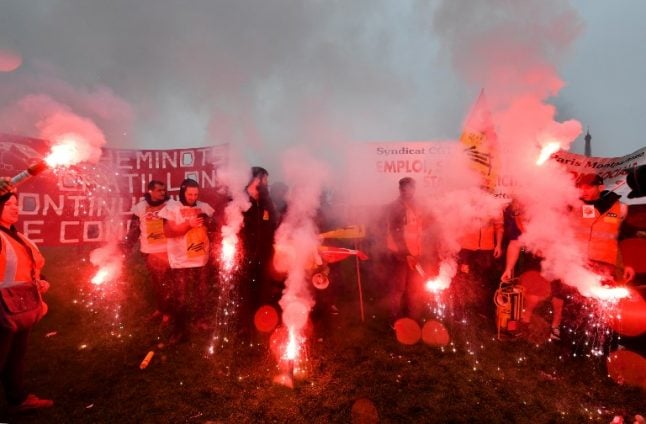French rail operator SNCF said the percentage of rail workers opting to join the latest two day rolling strike on Monday had dropped to the lowest level since the industrial action began at the beginning of April.
On Monday only 13.97 percent of SNCF employees answered the unions' call to walk out. That compares to 33.9 percent of rail workers who joined the strike on its first day.
Nevertheless there was still widespread disruption of train services, particularly TER regional and Intercité mainline services. Some two out three high-speed TGV trains were running.
One reason why there was still disruption to services despite under 14 percent of workers joining the strike is that the rate of participation has been much higher among train drivers.
Although on Monday the percentage of train drivers on strike dropped under the 50 percent mark for the first time to 49.8 percent.
However when the strike began some 77 percent of train drivers joined the walk-out, which was why only one in eight high-speed TGV trains were running at the beginning of the movement and some regional lines were closed completely.
Monday marked the 23rd day of strike action since April 3rd when rail workers, called cheminots in France began their industrial action in protest over the government's planned reforms of the rail sector.
The percentage of ticket controllers who joined the strike on Monday was down to 40.9 percent, from 69 percent at the beginning of the strike.
READ ALSO: Q&A – What's the state of play with the French rail strikes?

Despite the falling number of strikers some unions have vowed to continue the fight in order to try and keep up the pressure on the government, although there are signs of a split with more moderate unions like the CFDT suggesting they are keen to end the conflict.
The strikes are scheduled to be held until the end of June (see calendar below) but with senators set to discuss the reforms on Tuesday, Roger Dillenseger from the UNSA union said the strikes would not be halted.
“There is no question for the moment of stopping the movement. It is a question of maintaining the pressure on the Senate, and especially not to leave it free to validate the reform as it stands,” he said.
But if no agreement can be found to pacify the rail unions there will be fears the strikes will run on into the summer holidays.
That's a prospect that would worry rail chiefs as well as all holiday makers in France.
“The French couldn't stand the strike during the summer holidays, and I think that the rail workers themselves, who are responsible people, do not want to spoil their holidays,” said French rail chief Guillaume Pepy.



 Please whitelist us to continue reading.
Please whitelist us to continue reading.
Member comments